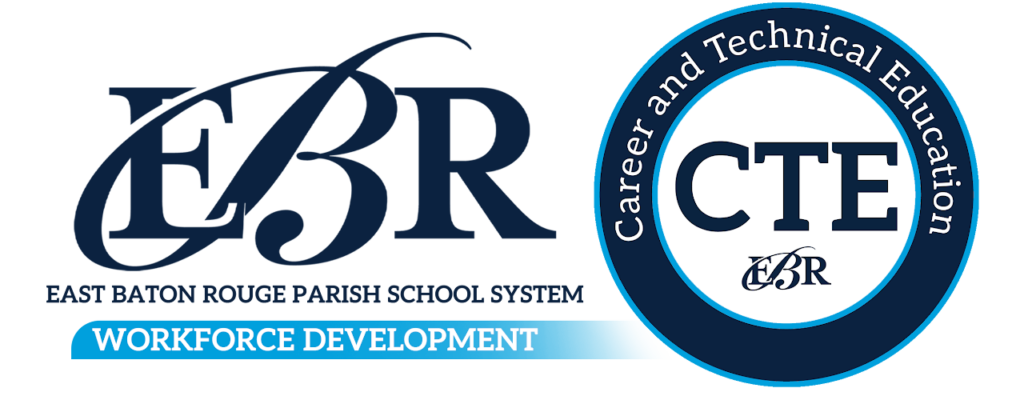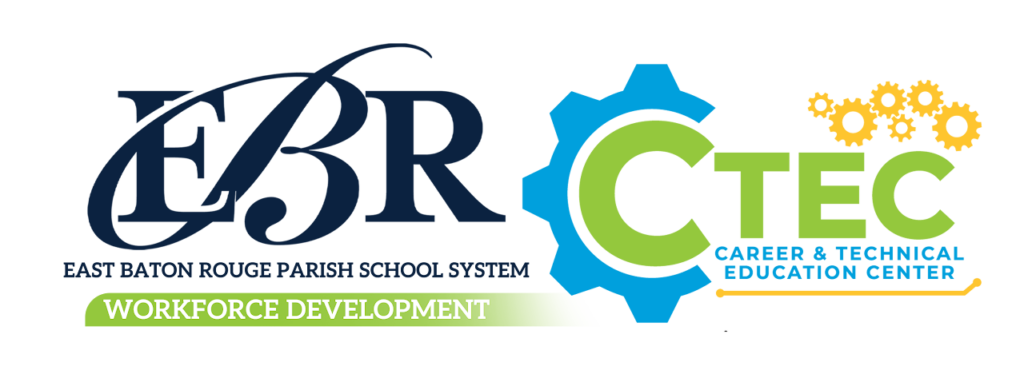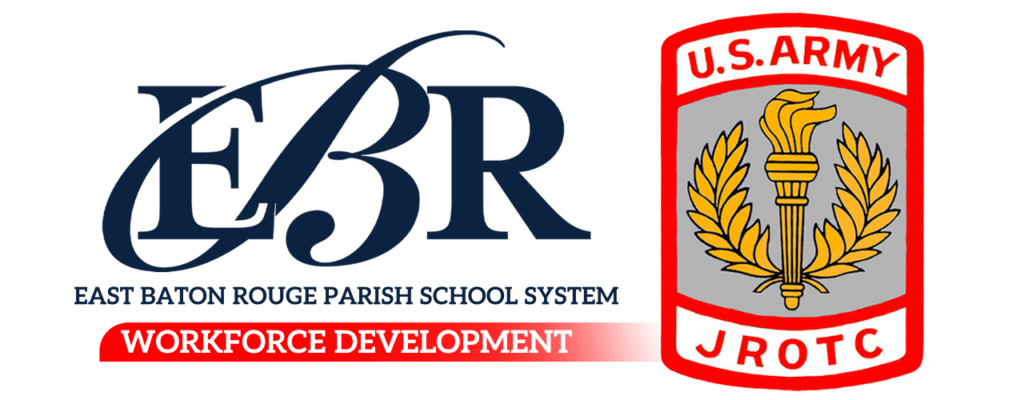Home / Division of Academics / Office of Workforce Development
Home / Division of Academics / Office of Workforce Development
The EBRPSS Office of Workforce Development supports the Career and Technical Education Department, the Career and Technical Education Center (CTEC), and JROTC, collectively focusing on equipping students with practical skills, industry-based credentials, and leadership abilities through internships and work-based learning. These programs ensure students are prepared for high-demand careers, higher education, and personal growth while aligning with the Capital Region’s workforce needs and providing equitable access to LDOE-aligned Career Diploma Jump Start Pathways. The Office of Workforce Development partners with BRAC and GBRIA to establish strong connections and provide seamless support for graduation pathways. This includes helping students earn industry-based credentials and gain work-based learning experiences that align with the demands of high-wage sectors.

Career and Technical Education (CTE) Programs (Workforce Development): The East Baton Rouge Parish Career and Technical Education (CTE) programs aim to equip students with essential skills, knowledge, and experiences for various careers and technical fields. These programs support three focus Career Diploma Jump Start Pathways at each high school within the district and internship experience in partnership with community businesses.
CTE Focus:
Work-Based Learning Partnership: We work in partnership with BRAC to align the educational needs of business and industry. This initiative allows business and industry to steer education to the specific industry needs while training their future employees and ensuring we retain our talent. The network will bring workforce and education together to be solution-oriented.
We work in partnership with BRAC to provide work-based learning opportunities supporting TOPS U and TOPS Tech students and ensure career alignment to the LDOE Career Pathways
The East Baton Rouge Parish Career and Technical Education | CTE/CATE programs are designed to provide students with the skills, knowledge, and experience necessary for success in various careers and technical fields. The Career and Technical education departments work to support three focus Career Diploma Jump Start Pathways at each high school in the EBRPSS.
The purpose of these programs can be broken down into several key areas:
Skill Development: CTE programs focus on equipping students with practical, job-specific skills that are in demand in the workforce. This includes hands-on training in LDOE aligned career pathways aligned to the communities workforce needs.
BRAC’s Talent Action Committee has identified five high-wage, high-demand sectors which we have aligned to the LDOE Career Diploma Jump Start Pathways:
Career Exploration: CTE allows students explore different career options and gain insights into various industries. By participating in CTE courses, students can make more informed decisions about their career paths and educational goals. Students who take CTE classes are more likely to graduate high school.
Industry-Relevant Education: Our office collaborates with local businesses and industry leaders to ensure that the curriculum remains relevant to current job market needs. This alignment with industry standards helps students acquire up-to-date knowledge and skills.
Certification and Credentials: We offer opportunities for students to earn industry-based credentials (IBCs). These credentials enhance a student’s employability and provide a competitive edge in the job market.
Work-Based Learning Experiences: Internships and apprenticeships provide students with hands-on experience in real-world job environments, allowing them to apply classroom knowledge, develop professional skills, and gain valuable industry insights.
College and Career Readiness: We aim to prepare students for both higher education and immediate entry into the workforce. They often include components that help students build soft skills such as communication, teamwork, and problem-solving.
Economic Development: By training a skilled workforce, our programs contribute to local and regional economic development. A well-trained workforce supports the growth of industries and businesses within the community.
Personal Growth: Beyond technical skills, our programs often focus on personal development, including building self-confidence, leadership skills, and a strong work ethic.
The purpose of the East Baton Rouge Parish CTE department is to bridge the gap between education and employment, providing students with the tools they need to succeed in their chosen careers while also addressing the needs of the local economy.

Career and Technical Education Center, CTEC (Workforce Development): CTEC serves as a regional hub for enhancing career readiness and technical skills among high school students across East Baton Rouge Parish. Key features include:
The EBR Career and Technical Education Center (CTEC) serves as a vital regional hub aimed at enhancing career readiness and technical skills among high school students in the East Baton Rouge School System. These programs ensure that all students throughout the parish have equitable access to all LDOE Career Diploma Jump Start Pathways and TOPS University Diploma career courses regardless of which high school they attend. CTEC has a business-led advisory board to ensure programs are aligned to community and industry needs.
Purpose of CTEC
Program Summary and Pathway Offerings
CTEC provides a variety of career pathways designed to meet regional business and industry needs.
Available programs include:
Student Experience
Students enrolled in CTEC remain registered at their home high schools but attend CTEC for half a day every other day. This arrangement allows them to benefit from specialized training while maintaining their connection to their home school.
CTEC is designed to provide comprehensive career and technical education that aligns with regional industry needs, promotes equitable access to career pathways, and enhances both student outcomes and local economic development.
Additional information coming soon!

Junior Reserve Officers’ Training Corps (JROTC) Programs (Workforce Development): JROTC programs at EBRPSS high schools focus on developing leadership, citizenship, and personal responsibility through military-style training. Key aspects include:
Program Components:
Benefits:
These programs bridge the gap between education and employment, providing students with the tools needed for successful careers while addressing regional workforce needs.
EBRPSS Junior Reserve Officers’ Training Corps (JROTC) programs are educational programs offered at high schools that focus on developing leadership, citizenship, and personal responsibility through military-style training.
Purpose of JROTC Programs
Program Components and Activities
Benefits of JROTC Programs
EBRPSS School with JROTC Programs
EBPSS JROTC programs provide students with valuable life skills, a sense of purpose, and opportunities for personal and professional growth. They are designed to prepare students for success both in their future careers and as responsible, engaged citizens.

The East Baton Rouge Parish School System and all of its entities (including Career and Technical Education Programs) do not discriminate on the basis of age, race, religion, national origin, disability, or gender in its educational programs and activities (including employment and application for employment), and it is prohibited from discriminating on the basis of gender by Title IX (20 USC 168) and on the basis of disability by Section 504 (42 USC 794). The Title IX Coordinator is Andrew Davis, Director of Risk Management – ADavis6@ebrschools.org, (225) 929-8705, 6550 Sevenoaks Avenue, Room #10, Baton Rouge, LA 70806. The Section 504 Coordinator is Danielle Staten – DStaten@ebrschools.org, (225) 930-5350, 12000 Goodwood Blvd, Baton Rouge, LA 70815.